Buddhism, Yoga and Low Self-Esteem | Mark Whitwell
By Mark Whitwell | Yoga Teacher at Heart of Yoga
The Buddhist dharma makes it very clear that there are fundamental difficulties to being alive. There is a fundamental difficulty in coming into individual form, struggling to grow and then passing out of this realm back into the eternity from which you came. It is a difficulty that we cannot avoid, and the Buddhists understand this very well. This is why their great teachers such as the Dalai Lama place so much emphasis on suffering.
In the West, however, we’ve been indoctrinated to imagine that we can attain happiness as a permanent condition. And we try to acquire that state of being with acquisition of all kinds: house, car, relationship and money. When that fails we turn to spiritual materialism and seek permanent happiness through religious seeking and working away on ourselves with meditation and yoga. But when that fails and we find out that life is suffering, we add shame to that part of life’s equation. And so westerners suffer en masse from low self-esteem.
When the Dalai Lama first started teaching in the West, he was shocked to hear about this illness. A meditation teacher had asked him how she could help her students with low self esteem, and he replied: “What is that?” It turns out, there was no such thing in Tibetan culture, nor an equivalent word that his translator could come up with. In Tibetan culture, everyone’s educated to understand that life is fundamentally difficult. And when they start to suffer they don’t add shame and low self-esteem to that burden.
Of course, the fact of suffering is not the whole of the Buddha’s dharma. The next statement in the traditions is that the appropriate response to suffering is therefore compassion to yourself and others. Compassion and kindness are what you can do to reduce the fundamental difficulties of life. They are the practical actions that help.
How can we take the action of compassion in our lives?
What certainly doesn’t help is to be given a social model as an ideal that we need to look up to and aspire to become like. The solution given by both traditional and new-age religious and spiritual teachers is to present themselves as yet another ideal to be replicated. Yet the model of the perfect person implies that everyone else is not perfect, and only adds to our suffering. It stimulates a struggle within the arbitrary self-improvement criteria of culture. Our suffering, and the deep dysfunction of society, makes us gullible to shoddy spiritual goods of all kinds.
In my life, I have found no substitute for an actual daily Yoga practice. Yoga is the practical action of compassion to yourself in the midst of life difficulties. To move and breathe in the polarities of the Heart is a powerful act of kindness to your life. It is the kindest thing that you can do for yourself and your body.
We only have to sweep our bodies with the breath to have a direct experience of our own Buddhahood, which is already completely established in us, as us, as life itself. Our natural world is utterly beautiful. In a very ordinary, non-heroic, non-obsessive way we can feel our tangible condition of life, “the absolute,” through Yoga. The body gets to feel its natural state. We have the strength of life in us, which at the same time is soft and completely receptive. This strength is completely responsive to the life around it, always moving, feeling and receiving in natural ways. This Yoga is the love of Self — capital ‘S’. It is the love of Life Itself.
Because we have not been educated to know about our Buddha Nature-the fact that we are the power of the Cosmos, the intelligence, harmony and beauty of Life Itself-we need a means of re-linking our minds to this most fundamental condition of Life. We require a visceral connection to Reality Itself.
Inevitably, people find that when they start caring for themselves through a simple daily Yoga practice, spontaneously they become kind to others. If I love my Life then I can naturally and effortlessly love you. It has profound implications to our social disorders of hard-heartedness by bringing kindness in as the principle of social life.
My teacher Krishnamacharya said that duhkha- a word that translates as suffering, or, the restrictions around the heart- is the unavoidable motive of practice. Our suffering is the goad that motivates us to take action. So if you feel the difficulties of life, or if you feel the heavy weight of the social mind with its mad presumptions of separation, yoga is there for you as a way to gently open your body and mind to the nurturing that is always upon us.
*Join my friends and I for live classes and conversations in the online heart of yoga studio. We are here to help you get the Yoga that is right for you.
